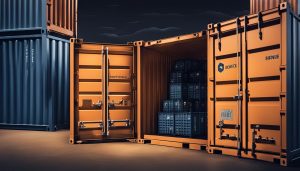The Docker CLI (Command Line Interface) is a powerful tool that allows users to interact with Docker and manage containerized applications through a command-line interface. It is an essential component of Docker’s architecture and provides a wide range of commands and options for building, running, and managing Docker containers. The CLI enables developers and DevOps professionals to perform tasks such as creating and managing images, running containers, managing networks, volumes, and much more. By mastering the Docker CLI, users can effectively leverage the full potential of Docker for efficient container management.
Key Takeaways:
- The Docker CLI is a powerful tool for managing Docker containers.
- It provides a command-line interface for building, running, and managing containerized applications.
- By mastering the Docker CLI, users can efficiently manage images, containers, networks, and volumes.
- The Docker CLI plays a crucial role in DevOps practices, enabling efficient containerization and deployment automation.
- Docker provides comprehensive documentation and resources for understanding and mastering the Docker CLI.
What is Docker?
Docker is an open-source platform that revolutionizes the process of software development, shipping, and running applications. By utilizing containerization technology, Docker simplifies the packaging and deployment of applications into Docker containers. These containers are self-contained units that encapsulate everything needed to run the application, including the code, runtime, system tools, libraries, and settings.
Containerization enables developers to build and ship applications consistently across different environments, improving the portability and scalability of software. Docker containers are lightweight and isolated, ensuring that applications run consistently and reliably regardless of the underlying infrastructure.
Docker also introduces the concept of Docker images, which are read-only templates for creating containers. Images are built from layers, allowing for efficient sharing and versioning of containerized applications through Docker registries. The flexibility and simplicity of Docker make it a popular choice among software developers and DevOps professionals for building, testing, and deploying applications.
With Docker, developers can focus on writing code without worrying about the underlying environment. They can easily package their applications, along with all the necessary dependencies, into Docker containers that can run on any machine with Docker installed. This eliminates the “it works on my machine” problem and ensures consistent behavior across different development and production environments.
Overall, Docker has revolutionized the software development process by providing a standardized and efficient way to build, ship, and run applications. Its containerization technology offers numerous benefits, including improved portability, scalability, and consistency. By leveraging Docker, developers can streamline their workflow and accelerate the development and deployment of applications.
Benefits of Docker CLI for Container Management
The Docker CLI (Command Line Interface) offers numerous benefits and features that make it an essential tool for efficient container management. By mastering the Docker CLI, users can leverage its capabilities to streamline container operations and enhance productivity.
Simplified Container Management
With the Docker CLI, managing containers becomes easy and intuitive. Users can create, start, stop, and restart containers with simple commands, eliminating the need for complex manual configurations. This simplification reduces the learning curve and allows users to focus on their core tasks without getting bogged down by tedious container management processes.
Container Versioning and Distribution
Another key advantage of the Docker CLI is its ability to manage container versions and distribute them efficiently. Docker CLI commands enable users to build and tag container images, making it easier to track and manage different versions. Additionally, Docker CLI supports seamless distribution of container images across various environments, ensuring consistency and reliability in application deployment.
Integration with Automation Tools
The Docker CLI integrates seamlessly with popular automation tools, making it an ideal choice for DevOps workflows. By incorporating Docker CLI commands into automation scripts and pipelines, organizations can achieve consistent and repeatable container deployments. This integration enhances scalability, reliability, and efficiency in software development and deployment processes.
Effective Resource Management
The Docker CLI provides robust features for managing resources within containers. With Docker CLI commands, users can allocate and limit resources such as CPU, memory, and network bandwidth for individual containers, ensuring optimal performance and resource utilization. This level of control enables efficient multi-tenancy and enables organizations to make the most of their infrastructure resources.
| Benefits | Description |
|---|---|
| Simplified Container Management | The Docker CLI provides a user-friendly interface for managing containers, simplifying the process and reducing complexity. |
| Container Versioning and Distribution | Docker CLI commands enable users to build and distribute container versions efficiently, ensuring consistency in deployments. |
| Integration with Automation Tools | The Docker CLI seamlessly integrates with automation tools, enhancing scalability and reliability in DevOps workflows. |
| Effective Resource Management | With Docker CLI, users can allocate and limit resources within containers, optimizing performance and resource utilization. |
The Docker CLI offers these and many more advantages for container management, making it an indispensable tool for organizations adopting containerization in their software development and deployment processes.
Docker CLI Commands for Efficient Container Management
The Docker CLI provides a comprehensive set of commands that allow you to efficiently manage Docker containers. Whether you are building, running, or managing containers, these commands are essential for effective container management. Here are some key Docker CLI commands that you should be familiar with:
1. docker run
The docker run command is used to create and start a new container from a Docker image. It allows you to specify various options, such as the image to use, container name, ports to expose, environment variables, and more. This command is the starting point for running containers.
2. docker ps
The docker ps command allows you to list all the running containers on your system. It provides information such as container ID, image used, status, ports, and more. With the -a option, you can also see all containers, including those that are not currently running.
3. docker stop
The docker stop command is used to stop running containers. You can specify either the container ID or the container name to stop a specific container. Stopping a container gracefully allows it to clean up resources and perform any necessary cleanup tasks before exiting.
4. docker rm
The docker rm command is used to remove one or more containers from your system. You can specify either the container ID or the container name to remove a specific container. Note that you cannot remove a running container, so you will need to stop it first using the docker stop command.
These are just a few examples of the Docker CLI commands that you can use for container management. By learning and mastering these commands, you can effectively leverage the power of Docker for your containerized applications.
Docker CLI and DevOps
The Docker CLI plays a crucial role in DevOps practices, particularly in the areas of containerization and continuous integration/continuous deployment (CI/CD). As organizations adopt DevOps methodologies to streamline their software development and delivery processes, containerization has emerged as a key technology for ensuring consistency and efficiency across different environments.
By leveraging the Docker CLI, DevOps teams can easily manage and orchestrate containerized applications. They can use the CLI to build, run, and manage Docker containers, allowing for seamless integration of containers into their CI/CD pipelines. The Docker CLI provides a simple and intuitive interface for automating container management tasks, enabling DevOps professionals to achieve greater efficiency and productivity.
Furthermore, the Docker CLI enables easy integration with popular CI/CD tools, such as Jenkins or GitLab CI/CD, allowing for seamless deployment of containerized applications. DevOps teams can leverage the Docker CLI to automate the entire software development and deployment process, from building Docker images to deploying them to production environments. This automation helps teams achieve faster release cycles, improved scalability, and increased reliability.
In summary, the Docker CLI is an indispensable tool for DevOps practitioners looking to embrace containerization and streamline their software delivery processes. By leveraging the power of Docker CLI in DevOps, organizations can achieve greater efficiency, consistency, and automation in their application development and deployment workflows.
Benefits of Docker CLI in DevOps:
- Simplified container management
- Streamlined integration with CI/CD pipelines
- Efficient automation of software development and deployment processes
- Consistency across different environments
- Improved scalability and reliability
Docker CLI Documentation and Resources
When it comes to mastering the Docker CLI, having access to comprehensive documentation and resources is essential. Docker provides official documentation that serves as an invaluable reference for understanding and utilizing the Docker CLI effectively.
The Docker CLI documentation covers a wide range of topics, including detailed explanations of commands, concepts, and best practices. Whether you’re new to Docker or an experienced user, the documentation offers guidance and insights to enhance your container management skills.
In addition to the official documentation, there are various online tutorials and guides available to further expand your knowledge of the Docker CLI. These tutorials provide step-by-step instructions, practical examples, and tips that can help you navigate the intricacies of the CLI and make the most of its features.
By taking advantage of the Docker CLI documentation and resources, you can gain a deeper understanding of the CLI’s capabilities and become a proficient user. Whether you’re looking for command references, troubleshooting guidance, or best practices, these resources are invaluable assets as you navigate the world of Docker container management.
Table: Docker CLI Resources
| Resource | Description |
|---|---|
| Official Docker Documentation | The official Docker documentation provides detailed explanations of Docker CLI commands, concepts, and best practices. It covers a wide range of topics and serves as a comprehensive reference for Docker users. |
| Online Tutorials and Guides | Various online tutorials and guides offer step-by-step instructions, practical examples, and tips for mastering the Docker CLI. These resources can help you deepen your knowledge and enhance your container management skills. |
| Community Forums and Discussion Boards | Engaging with the Docker community through forums and discussion boards can provide additional insights, troubleshooting assistance, and real-world use cases related to the Docker CLI. |
Docker CLI: A Powerful Tool for Container Management
The Docker CLI (Command Line Interface) is a critical component of Docker’s architecture, providing developers and DevOps professionals with a powerful command-line tool for managing Docker containers. With its extensive range of features and commands, the Docker CLI empowers users to efficiently build, run, and manage containerized applications. Let’s explore some of the key features and advantages of the Docker CLI.
Key Features of the Docker CLI
The Docker CLI offers a wide range of features that simplify container management. Here are some of the key features:
- Container Creation and Management: The Docker CLI allows users to create and manage containers effortlessly. With simple commands, developers can spin up new containers, specify configurations, and manage container states.
- Image Manipulation: Docker CLI provides comprehensive functionality for working with Docker images. Users can pull, push, and tag images, as well as inspect image details and history.
- Networking: Docker CLI enables users to create and manage networks for container communication. It offers commands to create networks, attach containers to networks, and configure network settings.
- Volume Management: Docker CLI facilitates the management of volumes, which are used for persistent data storage in containers. Users can create, attach, and manage volumes easily.
Command-Line Efficiency and Flexibility
“The Docker CLI provides a command-line interface that offers a high level of efficiency and flexibility in managing Docker containers. With its concise syntax and extensive command set, the Docker CLI allows users to perform complex container management tasks with ease.
The Docker CLI’s command-line interface allows for automation and scripting, enabling users to integrate container management tasks into their workflows seamlessly. With the ability to write scripts and execute commands, developers can automate repetitive tasks and streamline container management processes.
Furthermore, the Docker CLI is platform-independent, allowing users to interact with Docker containers consistently across different operating systems and environments. This platform consistency ensures that container behavior remains predictable and consistent, regardless of the underlying infrastructure.
Overall, the Docker CLI is a robust and versatile tool that empowers users to efficiently manage Docker containers. Its wide range of features, command-line efficiency, and platform independence make it an indispensable tool for containerization and DevOps practices.
Conclusion
After exploring the Docker CLI (Command Line Interface), it is clear that this powerful tool is indispensable for efficient container management. With its extensive features and commands, the Docker CLI allows users to easily build, run, and manage Docker containers, unlocking the full potential of Docker for software development and deployment.
By mastering the Docker CLI, developers and DevOps professionals can streamline their workflows, achieve greater consistency, and automate various tasks. The CLI offers a simple and intuitive interface for interacting with Docker, making it easy to create and manage containers, networks, and volumes. It also plays a crucial role in DevOps practices, facilitating containerization and enabling seamless integration and deployment automation.
In conclusion, the Docker CLI is a fundamental component of Docker’s architecture and a must-have tool for anyone working with containers. Its extensive capabilities empower users to efficiently manage containerized applications, improving productivity and enabling successful software development and deployment. With the Docker CLI, container management becomes a breeze.
FAQ
What is the Docker CLI (Command Line Interface)?
The Docker CLI is a powerful tool that allows users to interact with Docker and manage containerized applications through a command-line interface. It provides a wide range of commands and options for building, running, and managing Docker containers.
What is Docker?
Docker is an open-source platform that simplifies the process of developing, shipping, and running applications. It utilizes containerization to package applications and their dependencies into Docker containers.
What are the benefits of Docker CLI for container management?
The Docker CLI offers several benefits, including a comprehensive set of commands for managing Docker containers, a simple and intuitive interface, and the ability to perform various tasks with ease.
What are some key Docker CLI commands for container management?
Some key Docker CLI commands for container management include creating and managing images, running containers, managing networks and volumes, and much more.
How does Docker CLI contribute to DevOps practices?
The Docker CLI plays a crucial role in DevOps practices, particularly in the areas of containerization and continuous integration/continuous deployment (CI/CD). It enables greater efficiency, consistency, and automation in software development and deployment processes.
Where can I find Docker CLI documentation and resources?
Docker provides comprehensive documentation and resources for understanding and mastering the Docker CLI. The official Docker documentation serves as a valuable reference, offering detailed explanations of commands, concepts, and best practices.
What makes the Docker CLI a powerful tool for container management?
The Docker CLI is a powerful tool that provides a command-line interface for managing Docker containers. With its extensive range of features and commands, it empowers developers and DevOps professionals to efficiently build, run, and manage containerized applications.
Hi, I’m Mark, the author of Clever IT Solutions: Mastering Technology for Success. I am passionate about empowering individuals to navigate the ever-changing world of information technology. With years of experience in the industry, I have honed my skills and knowledge to share with you. At Clever IT Solutions, we are dedicated to teaching you how to tackle any IT challenge, helping you stay ahead in today’s digital world. From troubleshooting common issues to mastering complex technologies, I am here to guide you every step of the way. Join me on this journey as we unlock the secrets to IT success.


